#soren analysis
Text
Alternatively, Soren is being truthful when he says liking and disliking don't matter in this context because he has such a huge blind spot for his own bias that he genuinely believes Ike is *objectively* the most perfect and amazing person who ever lived and that believing otherwise is equivalent to thinking 2+2=22.
No wonder he said Shinon was as dumb as a gnat, lmao.
9 notes
·
View notes
Text
this is one of the most beautiful, heartbreaking and bittersweet lines in all of The Dragon Prince.



Definitely a good addition to the Viren as an Allegory for a Narcissistic Parent -reading of Viren's story arc. Speaking of which-
Viren's apology here is the perfect fantasy of someone who grew up with a narcissistic parent, right?
It's the ultimate fantasy of what if the person who abused you saw how unfair and cruel they have been and acknowledged the harm they have caused to people close to them? How they finally take accountability and lift the burden off their children's shoulders. Viren literally starts his apology with "I see you, Soren" acknowledging Soren's pain.
TDP is really good at making the dramatic story climax more impactful by putting a lot of focus on the slower emotional build-up before the main event. Viren dying in a moment of self-sacrifice is symbolically powerful but it isn't exactly relatable. What makes it so meaningful to me are these seemingly small, more subtle, less fantastical moments, the build-up before the pay-off. It's a good balance of fantasy epicness and realistic human emotion.
To me this line encapsulates Viren's true sacrifice. He lets go of his ego, being stripped away of his status and has to face the fact that he has failed as a protector of his kingdom and his children. It's an extremely vulnerable moment for him and it's almost painful to watch because both Soren and Viren's perspective and feelings feel very human and understandable.
THIS line feels like the true moment of sacrifice to me. Viren lays his feelings bare without any signifiers of status as a High Mage of Katolis and without the authority of a parent to shield him from criticism.
#stupid cartoon dad makes me almost cry again#tdp spoilers#tdp s6 spoilers#tdp viren#tdp meta#the dragon prince#tdp soren#tdp claudia#tdp analysis#sarasade text
171 notes
·
View notes
Text
“Our family was shattered forever.” Let’s delve into the two images accompanying this line, shall we?

Before the shattering:
Soren is looking up at Viren, who saved his life and he chose to stay with, for comfort, guidance or connection. Viren doesn’t reciprocate, fixated on the loss of his wife. The staff of Ziard, which Viren used to imprison K’ppar and Aaravos crafted for his pawns, is a barrier dividing them that Viren actively holds in place.
Viren and Soren are framed inside the arch furthest away and Claudia to a lesser degree inside the nearer arch, enclosed in the wall, the structure of their family home. They are trapped. Lissa is free. She even blocks part of the wall and archway, visually overpowering it.
Lissa has an arm raised to her chest defensively, no longer feeling safe around Viren; Soren’s arms hang passively at his side; Viren’s posture is stiff, one hand on his staff and the other behind his back (as he’s becoming a more emotionally repressed and manipulative person who doesn’t always want to show his hand, so to speak); and Claudia’s are desperately, futilely reaching out to Lissa.
The children are both between their parents. Claudia is closer to Lissa, alone in her section of the frame. Soren is right next to Viren, making their height difference and power dynamic more obvious.
Claudia is in Viren’s shadow, which is framed as a bridge between Viren and Lissa in this brief instant before Lissa takes another step - darkness connects to her to her family. As with Soren, Viren doesn’t show any interest in her. Unlike Soren, her distance from him is her choice. She’s running ahead of him in the direction he’s facing, like in his dark magic dream where she follows in his footsteps and then surpasses him.
Claudia’s left leg is barely visible under her dress, looking almost like the stump it will eventually be reduced to.
Only Lissa and Claudia are crying. A link has recently been established between tears and dark magic, and while Lissa had a bodily fluid harvested for a spell against her will, Claudia will volunteer her blood when a spell demands it.
The light is literally behind the family with shadow surrounding them, indicating sunrise or sunset. Sunset would be most thematically appropriate for the last memory of the whole family, but it would make sense for Lissa to start her long journey at dawn in a time and place with such limited artificial illumination (especially without the use of dark magic). It is a new dawn for her as an independent woman, after all.

After the shattering:
The point of origin is Lissa, as her decisions to divorce Viren and let the children choose who to live with, leading to Viren raising them on his own, define the new state of the family. All the cracks radiate outward from her forehead, her mind, and she’s by far the most fractured. That’s a worrying picture of her mental health. The cracks break and distort her family and their home, but she cannot see this and clearly doesn’t intend it.
The same crack crosses through Soren and Viren and another vertical one descends part of the way between them as well. It hasn’t fully divided them yet, but it will.
Soren is gone except for his legs and head. His head - still searching for something in his father - is even lower and further away from Viren. None of the others are diminished like this. The imagery of a severed head and missing torso full of vital organs ironically evokes death, despite his preserved life and perfect health. Viren doesn’t kill him, but he will destroy much of his spirit.
Viren is almost completely duplicated, in contrast to Soren being eclipsed. His copy is fainter, shorter and overlaps partly with Soren’s legs, as if he’s replacing his son and the man he might grow into with a vision of himself. Perhaps he’s in two minds about the path he’s chosen? Or beside himself with grief under that cold exterior? He takes up more space, but is also broken and trapped more tightly in the fractures. Like Soren, part of him is lost; he’s the only one to have what appears to be a missing shard interrupt his depiction with a slice of nothingness, reflecting the piece of his soul that he’s turned into a black void. The head of his staff being above Soren’s legs represents dark magic replacing Viren’s relationship with his son in his life.
Claudia is actually intact, but a duplication of one of her legs is cut off. This may reference how she will duplicate her lower limbs into five tentacles and then have one of those cut off, Rayla probably thinking it was an extra that wouldn’t correlate to her human leg. Like Viren, she’s boxed in by the cracks, which draw lines between her and the rest of her family on all sides. Viren and Soren share a shard with Lissa, but Claudia doesn’t. Her indecisiveness has left her even more isolated.
#the implication that soren was closer to viren and claudia was closer to lissa or had equally strong bonds#and then each of their preferred parents abandoned them#tdp viren#tdp lissa#tdp soren#tdp claudia#mage fam#tdp spoilers#tdp analysis#tdp season 6#tdp s6
168 notes
·
View notes
Text




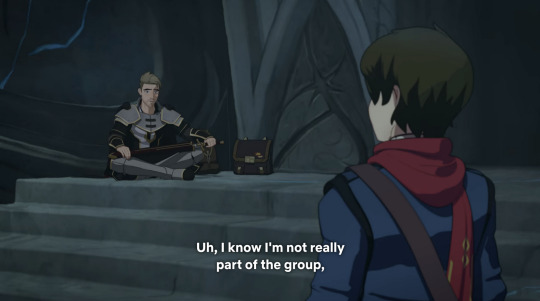
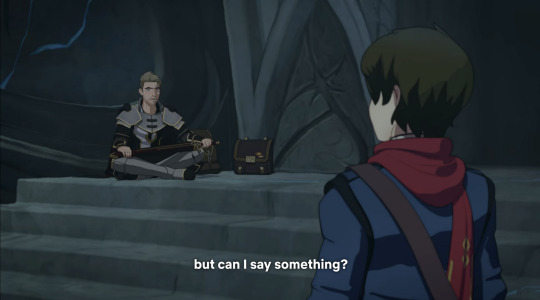

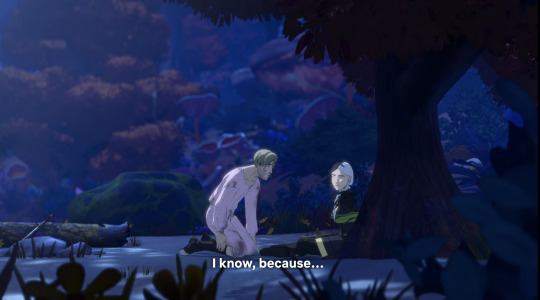


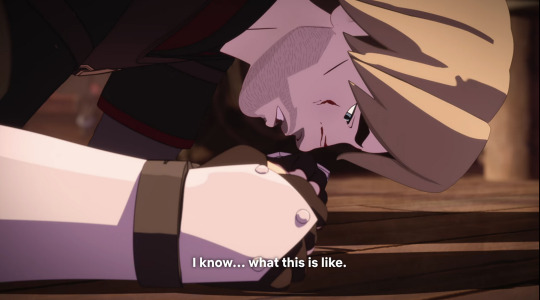


1x06 / 1x07 / 3x03 / 3x08 / 3x09 / 4x07 / 5x08
#tdp soren#soren#multi#arc 1#arc 2#theme: knowledge#mine#parallels#youtube analysis expecting me to take them seriously and they don't even notice the 'i know' motifs#tdp#the dragon prince
180 notes
·
View notes
Text
I started reading puzzle house, and I noticed something. There seems to be an age mismatch... In S6, soren looks about 6 ish. Claudia about 4... in the flashback that Lissa leaves. Which is preceded by kppar's disappearance. Soren is shown that young when Viren saved him. (Image credits : @raayllum and @stuck-in-jelly ) look how young soren is! Abd claudia is teeny weeny!

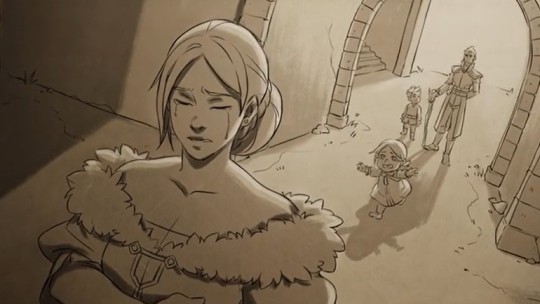
BUT IN PUZZLE HOUSE.... there's a scene between King Atticus (What a lovely man) and Viren.... he asks Viren how he is doing out of genuine concern!
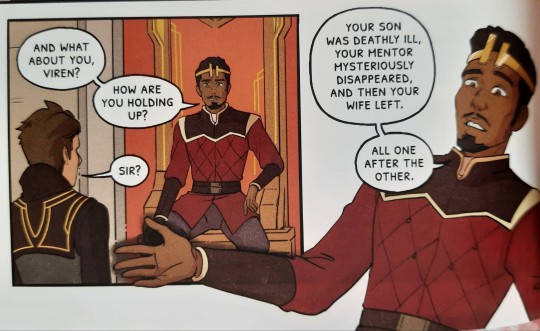
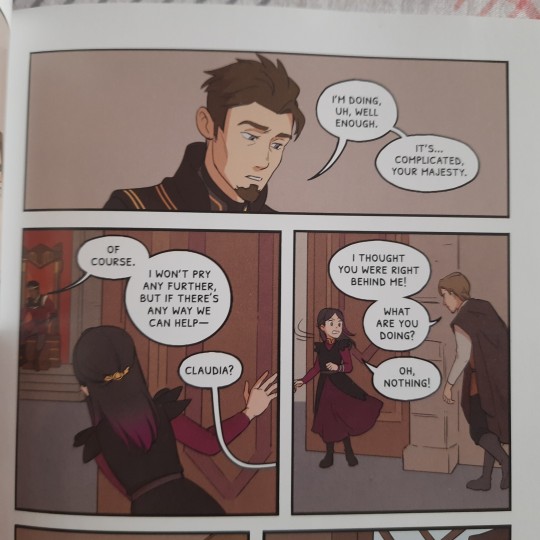
(Pardon the picture quality my camera is not so great)
THE FOLOW UP OF THE SAME INCIDENT THAT IS IN VIREN'S FLASHBACKS!!!! BUT SOREN LOOKS ABOUT 10ISH AND CLAUDIA ABOUT 8ISH!
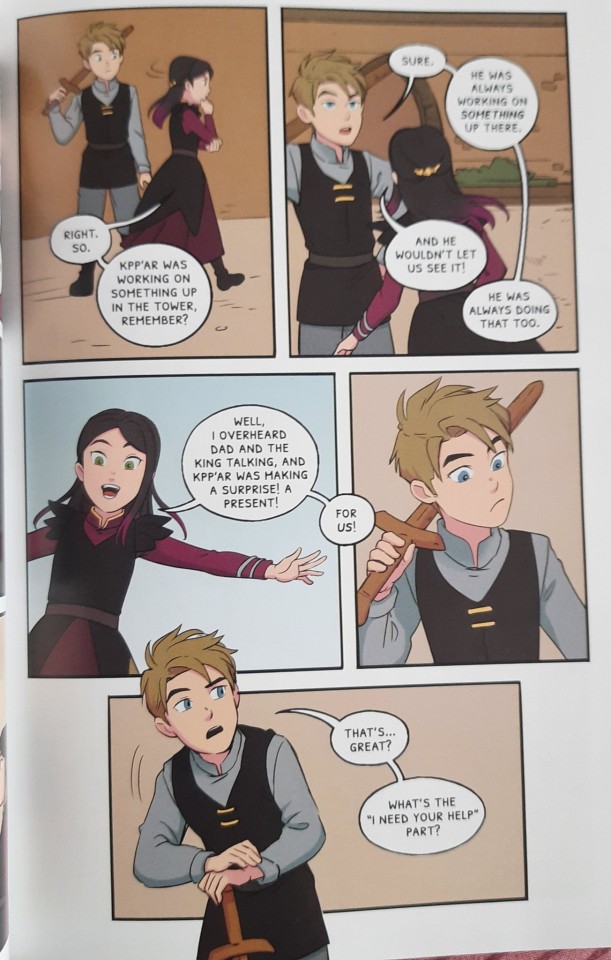
Now it is very much possible that the puzzle house happens very much later. Like after a time skip.
Also to note: claudia was given kppar's spellbook. Tge kids had been to his house multiple times atleast to mention "he never let us entertained his tower". Also Atticus asks the question as if it all happened fairly recently. Means tge flashback of s6 happened pretty close to the time of puzzle house no? But soren and claudia look older to me...
Wouldn't it make more sense if soren and claudia were a little older than how they are shown in s6 flashbacks to have known kppar! If soren is saved at an older age it would still work.
I don't know if it was a mismatch between the two departments handling the production of the season and the graphic novel. But their ages don't line up... like if all of those flashbacks of s6 happened with a little older claudia and soren, they would remember that incident much more strongly, and that is fitting for character!
I see three possibilities...
A) This is truly a mistake and there was a mismatch between the teams that made the season and the novel.
B) This is deliberate! They showed the flashbacks through Viren's POV. And maybe its the "to parents their children are always young" or this is just how he is seeing them in the memory of that incident now. Memories become distorted over time... we don't remember details and when we recall, we fill their place with details of how we felt that incident to be like, which is sometimes not what it actually was.... Viren's guilt makes him look at himself like the terrible man who hurt his two innocent children. And what better way to make a child look innocent than to literally age them down! Look at this image of claudia from one of the short stories... here she looks about her puzzle house age, seeing Lissa leave.

So it is true that the puzzle house ages are reality and the flashback ages are Viren's projections of his children as how innocent they were when he hurt their family. I AM ONTO SOMETHING HERE, I REALLY WANT THIS TO BE TRUE!
C) I could be wrong at judging character ages too (in that case it would be a bummer cuz what sort of animation student am I then?)
But what do you guys think? I am leaning towards the ages being shown that way is deliberate...
#the dragon prince#tdp#tdp theory#tdp analysis#tdp s6#the puzzle house#tdp the puzzle house#puzzle house#tdp soren#tdp claudia#tdp viren#tdp atticus#king atticus#soren#viren#claudia#kpp'ar#tdp kpp'ar#my meta#tdp meta
58 notes
·
View notes
Text
By doing right by Soren, Viren ended up unintentionally doing harm to Claudia.
Even though Viren didn't give him the letter which I was both happy and sad about. Sad because their mom leaving sucks, but she was scared I just wished she tried to take them both but in the end I understand. Soren didn't need to see the letter and know the truth because it would have taken away all the confidence he built up while Viren was gone he would have broken. By simply telling Soren that nothing was his fault, and Viren simply admitting it was all him bring a sort of closure. It also makes it so Soren isn't forced to forgive his father who was both his savior and abuser.
On the other hand Claudia gets no closure she didn't have the understanding of why Viren did what he did, or why he changed his mind. She was literally left in the dark. Viren thought by leaving her she would be better off and make choices for the betterment of herself. Claudia did everything for family because that's what she believed Viren also did, but Virens actions became corrupted and selfish. Claudia needed the clarity of that letter in a way Soren didn't.
Claudia has only been positively reinforced to use dark magic to solve her problems. Think about how her support structure consists of Terry, Viren, and Aaravos. Viren always had Claudia's best interests at heart, until he leaves free of dark magic. As far as she's concerned dark magic kept her tied to her father, and Aaravos has also been whispering to her about all the benefits, dark magic had gotten Viren back to her not once but twice. Terry on the other hand is supportive of her no matter what, unfortunately that is both a blessing and a curse. He'll let her choose for herself, but Aaravos is shaping her so she'll follow a dark path and Terry is also made to follow because he loves her.
Claudia having no answers or insight from Viren forces her to stay in the dark, while that lack of clarity pushes Soren forward.
#tdp spoilers#tdp s6#tdp#tdp s6 spoilers#tdp speculation#tdp characters#tdp analysis#tdp soren#tdp viren#tdp aaravos#tdp claudia#tdp magefam#mystery of aaravos#tdp mystery of aaravos#the dragon prince#thedragonprince#dragonprince#netflix
145 notes
·
View notes
Text
I haven't done one of these in forever but welcome back to Sketch Rambles About MCSM Stuff at an Unreasonable Hour of the Night 🎉🎉🎉
Tonight, I'm gonna discuss one of my favorite songs from the Minecraft: Story Mode OST, "Redstone Baby," and the potential lore that it holds. And why that's very Sorengaard related.
Disclaimer: this is me interpreting silly block people. Unless otherwise stated (or in the game), it ain't actually canon. Also, I am a teenage girl. I am not versed very well in the specifics of how music theory works and how it's used in media. Also also, I wrote most of this like two months ago and completely forgot about it.
(In case you needed a reminder of how it sounds)
youtube
This song appears twice in the season 1 episode 3: when you arrive in Soren's lab area, and again in the end credits. It can also be heard through the closed secret entrance wall in the Wool World™, and it gradually becomes clearer as you approach the door to Soren's lab, where a music disc is playing the song inside.
The instrumentation of "Redstone Baby" consists of guitar, piano, and violin. It feels comforting and cozy, whilst also giving a sad, longing sort of vibe. According to a comment written 6 years ago by Antimo on the linked video, they were going for a sorta "Fallout: New Vegas" vibe when they wrote it. The song holds an air of nostalgia, of better times. An idealized dream of how the world could be.
To get to the point: it's cute, it's cozy, and it's a love song in a game where they weren't allowed to explicitly write any canon ships (if I'm remembering correctly). Also one of the few songs in this game to be given lyrics. So, of course, we're gonna talk about this. Or rather I'm gonna write about it and you're gonna read it.
The lyrics go as follows:
In a marshmallow world, you're my sweetheart.
In a marshmallow world, you're my sweetheart.
You're the bed to my rock,
The flint to my steel.
My redstone baby doll...
My redstone baby doll.
(music)
In a marshmallow world, you're my sweetheart.
In a marshmallow world, you're my sweetheart.
My sugar baby...
aaaah ladada, awoah...
The lyrics are pretty strange, right? It seems nonsensical at first, but I (and many others) believe that it has more meaning than meets the eye.
This is a love song addressed to a someone proficient with redstone. Funnily enough, Soren's old friend group did have one of those. A brilliant Redstone Engineer: Ellegaard. And quite interestingly, these two were pretty close, as is said multiple times in canon. I think Magnus mentions their little "Nerd Club," in episode 3 at some point. Another fact to back me up on this: Soren calls the song "Symphony in E" in-game on the little radio-disk-program-thing.
And for whatever reason, Soren and Ellegaard didn't stay close or end up together. There's not really a way to know for certain what went down between them. All we do know is that Soren wishes it was different.
The "marshmallow world" that is talked about in the song is Soren's perfect world. It's safe, sweet, and fluffy. I am of the opinion that it could possibly be an indirect reference to the wool world that Soren built. It's bright. It's safe. No monsters can get him there. He can just build things and be happy. In a perfect, marshmallow world, Ellegaard is with Soren.
The metaphors Soren uses here, "the bed to my rock, the flint to my steel," they're both iconic, inseparable duos: bedrock, and flint and steel. In Minecraft, bedrock is the unbreakable foundation beneath all else in the Overworld. Flint and steel is used to set things on fire, and is most often used to light Nether portals, which is way less symbolic (unless someone can find something? maybe the whole flaming heart being a metaphor for love thing?) but still iconic and the phrase has a very nice rhythm to it.
When we first hear the song, it feels like normal wishful thinking. It's more just fluff and poetry than full-on wants and desires.
But when we hear it in the end credits of episode 3... We just saw someone die after sacrificing their safety for Jesse's. The monster that they died to help kill isn't even dead. Someone we thought was dead is actually alive and doesn't remember anything. It's loud, dark, and burning. A sickening storm of death and destruction. Anything but the marshmallow world.
Without considering which of the two died, this song is already quite jarring in comparison to what was just witnessed. This "marshmallow world" that seemed somewhat close just a moment ago now feels implausible, and thus it'd be worth so much more if it were real.
I will never not love when something in a piece of media is treated as a good sign or motif or something and then it gets recontextualized and hurts ya right in the feels.
And with Redstone Baby combined with Ellegaard dying, it's just that extra brutal.
Because now it's not just, "in a perfect world, we'd be together." It's "in a perfect world, you wouldn't be dead, and we'd be together."
If only Soren wasn't so much of a coward. How differently things could've gone.
#in summary: i love this song#we need more minecraft-themed love songs pls#i respect the other ships for soren and ellie but i will always ship them together because i'm a sucker for nerds in love#i'm not projecting i swear#< me when i lie#actual soren analysis post needs to happen at some point tbh#mcsm sorengaard#sorengaard#mcsm#mcsm headcanons#minecraft story mode#mcsm soren#mcsm ellegaard#ah yes the cowards of mcsm being far too relatable once again#hopefully my 3 am writing makes sense#mcsm analysis
23 notes
·
View notes
Note
hi. mentally ill about soren and claudia. the siblings in tdp all make me insane but soren and claudia are so. viren's daughter claudia and her brother soren (he doesn't like soren). the fact that at first claudia seems like the nice one but soren questions when he's doing the wrong thing and claudia digs herself deeper every chance she gets. that one scene where to protect ezran (?) (it's been a while since i watched this bit) he threatens claudia and she just looks so heartbroken and determined. they both do. because they still do care so so much about each other, it's just that they've taken such different paths and neither of them is willing to bend, not even for the other. <- not normal
OMG A TDP ASK FOR ME??????????????
Who doesn't love Soren and Claudia.
Like, Soren was willing to kill his father in the name of what was right, and Claudia was willing to bring her father back from the dead ignoring what was right ("I did things...I never imagined I would be able to do"). Claudia in s2 wants to "use [her] words not [her] muscles" but when it comes down to it, she's always going to use the strength dark magic gives her to get what she wants, and Soren has since learned that forgiveness and friendship are powerful things. Claudia has only distanced herself from the personhood of the creatures/people around her further and further (which is part of the danger of dark magic), while Soren has only become more and more aware of it.
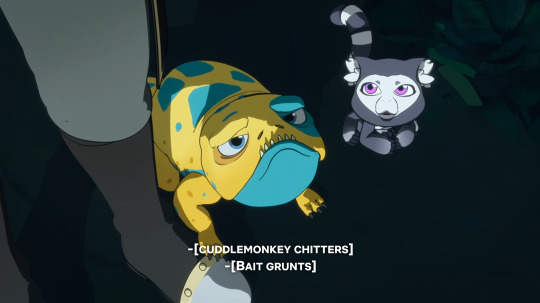
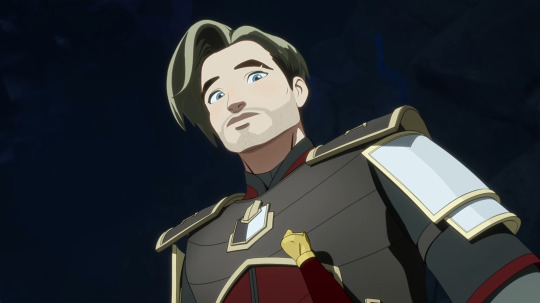
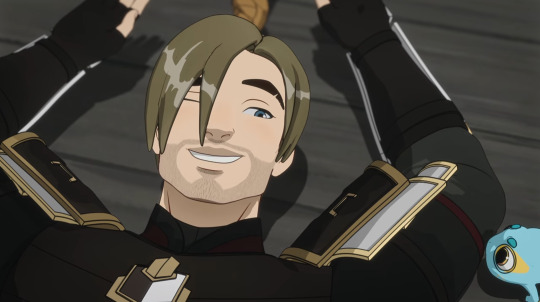
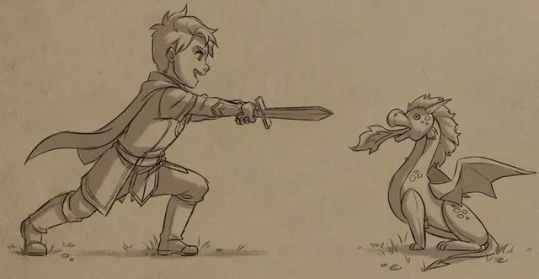

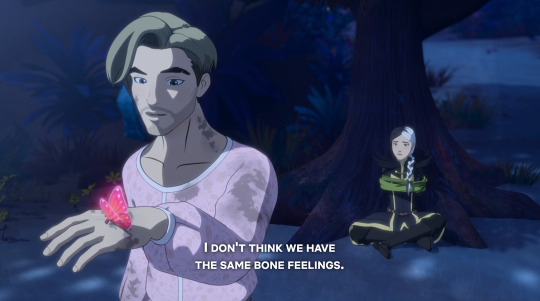
Soren would jump headfirst into the sea in heavy armor to save an innocent baitling, whereas Claudia would try and squeeze her former friends to death for the sake of her goal. They both have a completely different understanding of the value of life, at all different levels, with Viren learning that value later:
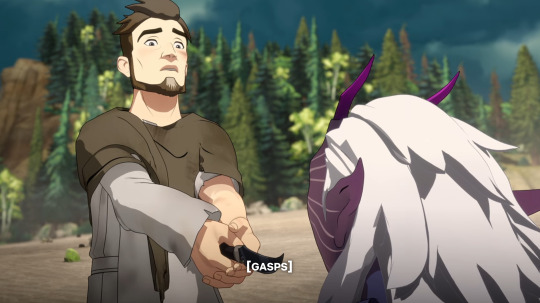
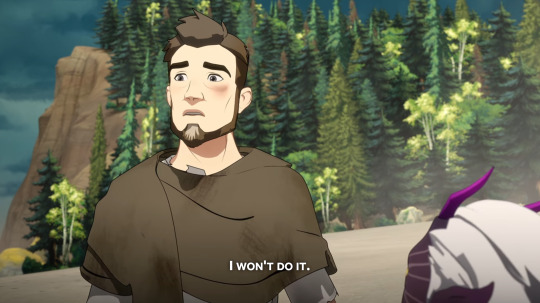
And I think Soren learning to value life more and more over the course of his arc 1 er, arc, only adds to the fact that he's willing to kill his father at the end of s3.
Had Soren been down in the ocean with the rest of the gang in 5x09, I think he wouldn't have hesitated in killing Claudia either, despite how much he cares about her.


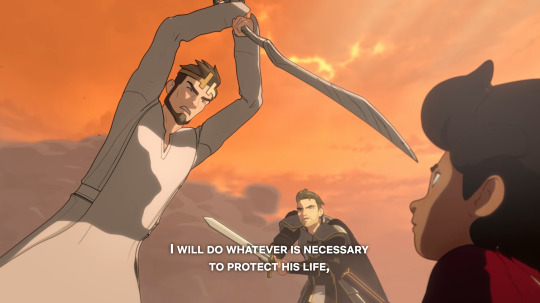

While Claudia's followed the dark path of her father ("Daddy look! I'm following in your footsteps!") Soren's been trying to walk a different path. To follow Ezran and his efforts for a brighter future.
I just think they're neat!

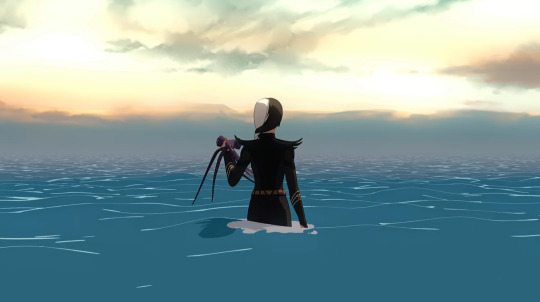
(For context, these scenes take place right after one another. Soren staying on the surface to look after their creature friends VS Claudia who sinks bellow to the ocean floor using the corpse of a pentapus)
Bonus "My eyes for truth" and seeing personhood comp:

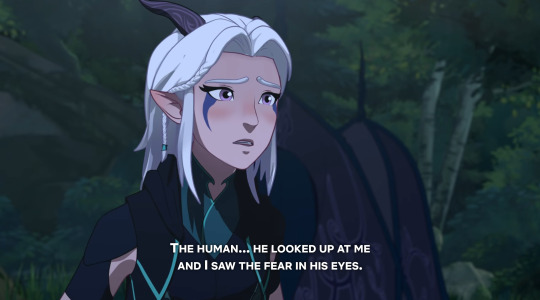
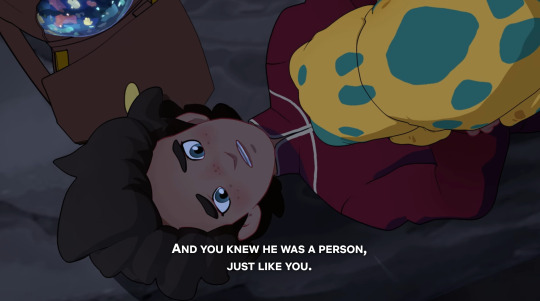
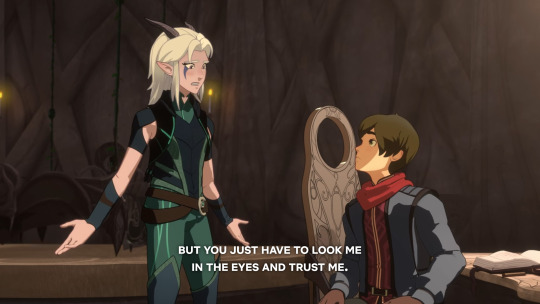
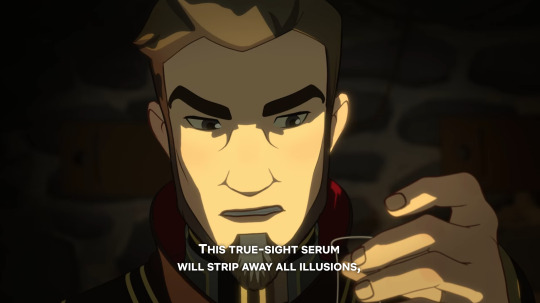
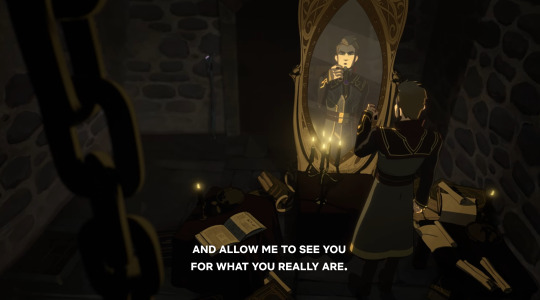
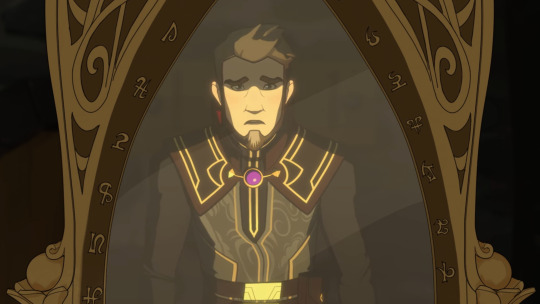
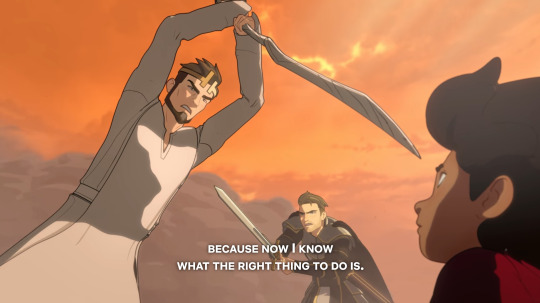
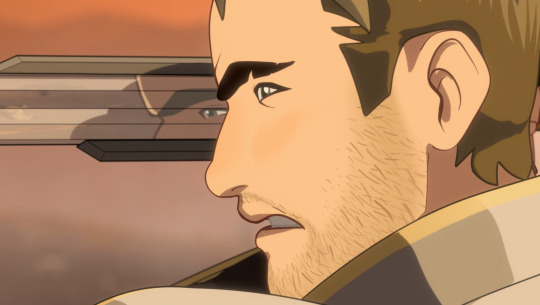
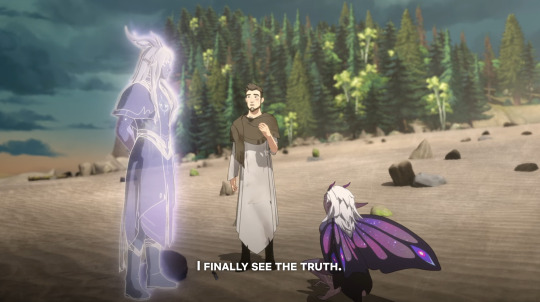
#thinking about how 'No matter where you are on the path- no matter what you've done before...every step forward is a choice! I am free'#also applies to walking on the path of light#Like for Soren reaching after Clauida. And Callum doing dark magic again in 5x08#You know what I'm saying#tdp#tdp analysis#tdp parallels#the dragon prince#tdp Soren#tdp Claudia#asks#gumy-shark#also tdp is insane with it's water/darkness symbolism#Like in 5x07 Soren is all like ''If you see Claudia again tell her I said hi'' and then he gives up and prepares to SINK and DROWN#Going back to the abyss are we Soren#Be amazed by how much I can overthink everything
92 notes
·
View notes
Text


Expanding upon the idea I put in the tags of this post on my main blog.
Viren saw the monstrous part of himself in Claudia when she killed to revive him, and abandoned her because of it. Mostly I think because he saw it as a hurt he was causing and ran away. The same way he emotionally abandoned Soren as a child because seeing his son reminded him of the hurt he caused for his family. He COULD HAVE been on a path to forgiving himself. I think his attempts to reconcile with Soren and apologize (however poorly managed) were brought on by the realization of what he’d done to Claudia.
And we see him let go of the shame he was feeling (writing out the events that occurred, burning the letter when he realized he couldn’t put that burden on Soren). But he does not see himself as worthy of another chance. He views himself as a monster, and he views Claudia as a monster. That’s the part of himself he left behind for her.
He also left behind the part of himself that we saw in his dark magic fever dreams. The younger version of himself that believed there is always hope, that there is always another path forward. That people can change. We see that reflected -
(oh hey mirrors/reflections as a symbol: Leola and the sea of the cast out reflecting the night sky, the reflection of the full moon in the water of the nexus when Rayla went to rescue her parents from the coins, Ethari seeing Rayla in the reflection of the sword when she’s a ghost, the reflection of Soren in his sword when he “kills” Viren ((mmm I love these Soren Rayla parallels)) also YALL I think Claudia’s gonna die like WHYS Soren alone in his reflection!)
in Soren’s character arc.
Harrow, Runaan, and Viren were all prepared to accept death as justice for their actions. They all knew they were guilty of continuing the cycle of violence. Harrow stopped being ashamed and felt remorse for the actions he took and their effects. We can see this in his letter to Callum. He has regrets, but he believes the justice he deserves is death, not forgiveness.
Viren is finally coming to terms with his guilt and shame when he writes his letter to Soren. And he never delivers it because he sees it for what it is. But that doesn’t mean he’s fully prepared to let go (he never tries to reconcile with Claudia and I’d have to watch it again because it’s hard to tell at that point if he’d even want to. That man really just threw her to the wolves). His death is his final cycle into violence. Falling back onto the crux of dark magic - even if it’s to save people - and the dark magic literally requiring him to die. He’s running away into what’s safe and comfortable instead of overcoming that fear and trying a different solution even if it would be harder. He could have left with Soren and found an alternative (this is a narrative, he made this choice for. a. reason). His life to save Soren’s was not the only option, it was his choice.
Runaan was ready to accept death until Claudia decided he’d be better used for information. Which ends with him trapped in a coin (very similar to the way Aaravos is trapped in the prison for eternity). He had an opportunity to overcome the violence and listen to Rayla and Callum about the egg. But he chooses the cycle of violence again. And it’s what consumes him in his limbo. And then having the second chance to overcome that violence and accepting it is what saves him.
This is getting rambley and it’s getting late, but like - do you see my vision? Do you see the parallels? The themes? And so on and so forth
#the dragon prince#tdp spoilers#tdp analysis#tdp viren#tdp runaan#tdp harrow#tdp claudia#tdp soren#tdp callum#tdp rayla#tdp ezran
19 notes
·
View notes
Text
i love how s1e3 foreshadows Viren's fate
something something Viren s1e3 saying only goodbye to Claudia something something Viren s4e1 saying goodbye to Claudia screaming for him to stay something something s1e3 Viren telling Soren the truth that he actually intends to die for the king because he knew Soren would understand and Claudia wouldnt something something s6e8 Viren dying for the realm and Soren respects that choice despite having offered his own life first
#magefam#tdp#tdp viren#tdp claudia#tdp soren#tdp katolis#tdp lord viren#tdp analysis#tdp parallels#tdp book 6#tdp book 6: stars#the dragon prince spoilers#tdp spoilers season 6
17 notes
·
View notes
Text
Alright, so I just finished season 4 of the dragon prince, and I know everyone is wondering why the hell Viren was able to adopt Terry (and Sir Sparklepuff) yet not able to speak to his own son. I was frustrated as well, as I've really been enjoying his characterization this season as seeming apprehensive and somewhat scared of what Claudia has been doing, and I wondered if this would lead to regret for his past actions.
I don't think that Viren will get a full redemption arc, but I do think that he probably didn't speak to Soren because he felt shame and confusion for how he treated him, and it was easier to just ignore his presence than acknowledge what he put his son through. With Claudia so intent on restoring Viren's life, it must serve as some hope that he was doing the right thing, however as he sees Claudia's descent into darkness, he becomes less and less sure of his past actions and feels more guilt that he can't bring himself to face. Seeing Soren is the personification of all that doubt, and he's just not...strong enough to face it yet.
Terry has not had any history with Viren; Terry serves as an exploration as the father Viren could have been to Soren, had he not been obsessed with power. Terry is silly and goofy and even irritating to Viren, and yet even with that, Viren is able to show some form of affection, however small.
I have a feeling Viren's story is going towards a Shadoweaver-type end, where no one really forgives him because his actions are irredeemable, and he's not a good person, but he is capable of love and care for his friends and family. I think come next season, we will get that conversation between him and Soren. I don't think that it will be wrapped up nicely in a bow, but I think Viren's complex feelings toward his son that he's developed will be vocalized and will lead to a turn.
On that note, I'm reminded of Soren's speech about his father being evil last season and his eagerness and pride in being one of the "good guys" this season. I love Soren, and he's grown a lot in this show, and I think he still has room for even more growth. He was able to escape his manipulative father (and please don't confuse my desire for a Viren-Soren talk for a need for Soren to forgive his father), and his perspective of the world changed drastically. But it's clear that he currently sees things in black and white, good and evil. He wants to pull Claudia to "the good side", his father is "evil". And in the time he captured Claudia, he only told her not to do something because it was wrong and evil instead of trying to understand why she would do something he sees as evil.
Anyway, this season was a lot of interesting setups, and I'm very curious to see where the writers take it.
#the dragon prince#tdp#tdp season 4#tdp spoilers#the dragon prince spoilers#viren#soren#claudia#terry#found family#daddy issues#shadoweaver#she-ra#the dragon prince season 4#essay#analysis#sir sparklepuff
167 notes
·
View notes
Text
From what I've seen so far, Soren really isn't mean to everyone in Engage. Just those who are giving him unsolicited advice (Stefans) and those who obnoxiously demand his attention (Skrimirs).
8 notes
·
View notes
Text
Magnifying Glass: "The Outcast"
Episode: "The Outcast"
Series: Star Trek: The Next Generation
Season 5, Episode 17
Original Air Date: March 16, 1992
Screenwriter: Jeri Taylor
Director: Robert Scheerer
I feel like Star Trek as a fandom doesn’t really talk about this episode enough. I find this episode extremely fascinating and have a lot of thoughts about it, but I don’t want to subject anyone who isn’t willing to my (VERY LONG) ramblings, so please, keep reading at your own discretion.

First, a quick synopsis: an alien planet called J'naii enlists the Enterprise-D to help them find a lost shuttlecraft in their star system. First Officer Commander Riker is paired up with Soren, a member of the J'naii, to devise a rescue mission for this shuttlecraft and along the way, the two catch romantic feelings for one another. However, the J'naii are a majority androgynous, aromantic and asexual race and those who deviate from this norm are persecuted and forced to undergo a kind of conversion therapy to "cure" their "condition". Soren confides in Riker her feelings towards him and her identity as a woman, things she could not share with her own people for fear of the violence she has seen others like her face. Understanding the risks, the two pursue a relationship with one another, but eventually the other J'naii find out and Soren is put on trial, where she makes an impassioned speech to stand up for herself and others like her. After the trial, Riker tries to fight for Soren's right to seek asylum with the Federation, but his support and efforts are in vain. Unfortunately, by the end of the episode, Soren has been subjected to psychological treatment and no longer feels any attraction to Riker. The Enterprise leaves, having finished their business with the J'naii and Riker is left to pick up the pieces of his broken heart.
I could go on and on about the "bury your gays"/"queer and trans people must suffer" trope this episode and others like it within the franchise fall into (i.e. DS9's "Rejoined" and ENT's "Cogenitor"). And while I will be criticizing the casting and writing decisions this episode's creators made, I think it's important to recognize the ways in which this episode does achieve some level of success with Star Trek's most favored format for addressing social and political issues; allegorical storytelling. However, I will be dragging this episode before I compliment it, so bear with me.
I’ll be honest…I’m not super jazzed about the way they handled sexuality in this episode. The J’naii reproduce asexually and it is not socially acceptable to have sex or procreate sexually in J’naii society. Which is in an of itself mostly fine, except that the writers portray the agender, aromantic and asexual J’naii as largely dispassionate, cold and close-minded, unable to connect with each other or other beings in meaningful ways which, hey, as an aroace person, that hurts to see. The J’naii are supposed to be an antithesis of (‘90s) Earth conventions of gender and sexuality, but in their creation as one of the very few sets of characters up until this point that are generally androgynous, aromantic and asexual, they fall in line with a kind of alienation not uncommon in Star Trek: ‘look at this species, they do things differently from the majority of humans! isn’t that neat? but it’s just unique to them, so what sets us apart from them must be what makes us fundamentally human’. Take Spock, Data, Seven of Nine and Odo for instance, all characters who on some level struggle with human/humanoid conceptions of sexuality and all characters who have a complicated relationship to humanity as they themselves are not (just) human. Each of them are generally received by human characters as cold and calculating and to have difficulty connecting with others intimately because they are not (just) human. The often-used trope is that if only they were human, they would understand what love is (queue Foreigner’s “I Wanna Know What Love Is”). This more broadly implies that romance and sex are essential to humanity and human intimacy, which they are not. Creating a species that predominantly operates in this cold and stagnant way creates a monolith of aromantic and asexual people and ignores the complexities of the aromantic and asexual spectrums when we really don’t get much explicit representation beyond this episode in the franchise.
Riker's actor Jonathan Frakes insisted that it would have been more impactful to cast Soren with a male actor rather than a cisgender actress. Indeed, because this episode was made specifically to challenge viewer attitudes towards homosexuality, such a decision surely would have shaken people’s foundations a bit more and would have actually better-achieved what the writers were going for. Maybe this episode would have been as beloved as “Rejoined” if it had featured Star Trek’s first kiss between two men; after all, Soren identifying as a woman still presents us with a male/female romance like all of Riker’s canonical romances. However, if they had had Soren still identify as a woman when played by a male actor, we would still have someone who does not live our stories telling our stories for us. A truly meaningful representation of trans people would have seen Soren cast with a trans actress. But as I mentioned, an allegory for trans people wasn’t really what the writers were going for and they probably didn’t see hiring actual trans people as a viable option in the first place. If you look on Memory Alpha, you will see that none of the writers in the room for “The Outcast” were trans or queer themselves. Jeri Taylor herself says that while she is not gay, she wanted to do this story because homosexuality is such a controversial issue and "as a woman [she does] consider [herself] in a particular minority; [she knows] what it feels like to be disenfranchised – not in that precise way – and [she] felt like [she] had a touchstone to some of the feelings that must be involved" (Captains' Logs: The Unauthorized Complete Trek Voyages, p. 240). I think it's admirable that she wanted to head a project like this and to give the issue a great deal more compassion than others would have in her place, but the fact still remains that she herself is not gay or trans, meaning that, again, people who do not live our stories and were mostly just fishing for clout were trying to tell our stories for us.

All this to say, I do think this episode has some things going for it that I would like to outline below. Because regardless of the casting decisions and the way the writers actually ended up handling conventions of gender and sexuality, functionally, Soren is a trans woman: she identifies as a gender different from the gender she was assigned at birth. And Riker falls for her and gives her his love with an open ease that Soren’s own people do not.
When I watched “The Outcast” for the first time, I hadn’t come out yet and I hadn’t even begun to delve into the world of my own gender or sexuality. So it wasn’t my trans awakening or anything, but it certainly is one of the things I ruminate on when I think back to, as we LGBTQIA+ people are wont to do, all the times when perhaps I could have realized it.
Yeah, I know this episode gives us just another of many Riker romances, but it is not at all flippant or without depth in the way it unfolds. The focal romance of this episode is part of what makes it all the more heartbreaking. Riker falls fast and hard for Soren in an era of American TV where trans characters were routinely played for laughs (I’m looking at you, Frasier). Popular cis male characters of the 1990s are vastly insecure about their masculinity and sexuality in interactions with trans people, particularly with trans women. If TNG teaches us nothing else, it certainly teaches us that Riker is admirably comfortable in both his masculinity and sexuality. Of course, Star Trek takes place lightyears ahead of the eras it’s filmed in. This episode was written in the 1990s and is therefore restrained in its exploration of gender by mainstream, Western ‘90s understandings of gender. But by the 24th century, humanity is supposed to have addressed and healed the wounds of its prejudices. So by the time the Enterprise sidles up to J’naii, humanity has had plenty of time to learn about and understand the multitudes of gender, not just in their own cultures but in those of other species (I’m thinking here of Star Trek’s tendency to favor Western cultural values over others). There are no mentions in this episode of the many genders that have been recognized by various Earth cultures throughout history and the writers did not anticipate the way in which gender identities and definitions have now been recovered and expanded, a process one might assume will only continue as we move forward.
"The Outcast" aired in 1992, when the term “nonbinary” had not yet made its way into mainstream English vernacular. But as pointed out above, it is not unaccompanied by other episodes in the franchise addressing gender politics: “The Offspring” showcases Data’s relationship to gender and his determination to let his android child decide their own gender; DS9 has an entire character whose gender and sexuality are fluid depending on their host and the symbiont Dax’s gender is never confirmed; the wormhole Prophets’ genders are never confirmed; there are many episodes in both TNG and DS9 which examine Ferengi gender politics; one episode shows us Sisko and Bashir excitedly discussing a male lieutenant’s pregnancy and upcoming baby shower; etc. However, while it's easy to argue that it would have been plausible for the human officers aboard Enterprise-D to easily grasp the concept of a species where androgyny is the norm, it is precisely the incongruity of a mainstream Western '90s understanding of gender paired with the supposed utopian Earth of the 24th century that makes this episode resonate with me (as I'm sure it has with others) in particular. Science fiction is more about the past than the future, after all. “The Outcast” approaches genderqueerness and pronouns with the compassion and curiosity expected of Starfleet. And because of this, we get to see multiple characters grow in this episode, particularly Riker and Worf, both of whom initially struggle with the idea of gender neutrality.

Now, getting into the romantic plot. Riker’s love for Soren is unconditional, a hopeful light in the face of two different worlds (Earth from our side of the screen and J’naii from the other) that constantly deny trans people our right to exist, which paint us as sick, demented, perverted, monstrous and disgusting. When Soren confides in Riker about her identity, he is not deterred. He is curious and kind, glad to have been shown this part of her truth, even as he struggles to understand J’naii’s general attitude towards gender. Furthermore, there are no reservations on Riker’s part about Soren’s appearance. Although Soren is played by a cisgender actress, binarism in our society pressures many trans people to transition medically in a way that Soren has not, an issue that is of no concern to Riker who is simply in love with her as she is. Which is cool, considering that the majority of Riker’s romantic interests are hyper-feminine. What this shows us is that Riker is not so shallow as to be concerned solely with a person’s appearance when it comes to who he's attracted to and does not so deeply equate gender presentation with gender identity that he is unable to see Soren as the woman she is. He is already attracted to Soren before she confides her gender identity to him.

Soren does not mention anyone who has felt similar feelings for her or for whom she has felt similar feelings and explains that the concept of gender is highly “offensive” to the J’naii. She has spent the majority of her life in fear of her truth being exposed, but in Riker’s company, feels safe to share it with him as he is an outsider who has shown an honest interest in learning. He comes to understand her in a way that she has not been allowed to let others understand her before, in a way that has not been safe before, which is the door that opens them both to their care and love for one another. Though we don’t get to see them learn all that much about each other personally, they do learn that they share an interest in exobotany and get to spent some truly heart-melting moments together.

Back on the Enterprise, Riker has a significant conversation with Deanna about Soren, expressing his deep love for her and letting Deanna know that he wants to continue to pursue a relationship with Soren. Again, this demonstrates that Riker is not only head over heels for Soren but also that he is secure in his masculinity and sexuality, nowhere near ashamed of the feelings he feels for Soren, but simply concerned for the stability of his friendship with his ex. We love a respectful, communicative guy.

We don’t get to see Soren express her feelings for Riker or any potential shame she might harbor about them to anyone but him, which we know would lead to her persecution if she tried to share it with another J’naii. Which leads us to the end of this episode.

The tragedy, of course, is that the other J’naii do find out and do not respond with compassion or respect. Even after Soren has given everything to valiantly make her case, to stand up for herself and others who share her experiences of gender oppression, Riker and Worf return to J’naii one last time to rescue her only to find out that they are too late; Soren has already been forced to undergo psychotectic treatment (i.e. conversion therapy). Riker makes one last desperate attempt to get Soren to recall her true self but…she doesn’t. She can’t. And that clipped connection, that final tear in the string that bound them together in an inextricable truth, is what haunts Riker as Ensign Gates takes the Enterprise-D out of J’naii’s orbit.

Obviously, I would have loved to see Riker and Worf succeed in their rescue attempt, have our intrepid heroes break the Prime Directive to save Soren and liberate the trans people of J’naii. Unfortunately, for this episode to work, for it to resonate with its viewers as a meaningful commentary on the way our society treats queer and trans people, the screenwriters obviously felt that the tragedy of losing Soren in the end would garner more sympathy. We see a similar take with episodes like DS9's aforementioned “Rejoined”, where Jadzia Dax’s resolve to live the rest of her life with Lenara Kahn is ultimately in vain. She can only watch helplessly from the balcony above the Promenade as Kahn leaves, having chosen instead to favor the life of her symbiont and its future hosts over spending what time she can with the love of her life. Homophobia and transphobia literally tear people apart - real, living, breathing, loving, caring people. To deny someone their right to stand in their own truth is to deny them their existence. The screenwriters for “The Outcast” made the conscious decision to have us witness this violence, to make us sit with it and understand that Soren represents the real experiences of real people. That the violence committed against queer and trans people harms both them and those who love them. Because Soren was loved. Is loved. She was held and shown a humility she for so long had no access to. And for a brief moment, she felt that love.
Absolutely, this episode could have been done better and I really, really wish they had hired actual trans people to tell Soren’s story or at least cast an actual trans actress to play her. But I do think there is something to be said for the episode’s fundamental, albeit accidental message which is that trans people are not broken or sick in the head. We are whole, vibrant beings entirely deserving of love, respect, support, happiness, care and, above all, life.
#star trek#star trek tng#st tng#star trek the next generation#s5e17#the outcast tng#soren tng#william t riker#transgender#trans#trans representation#trans women#trans coded#lgbtqia+#ds9#star trek tos#star trek ds9#star trek voyager#aromantic#asexual#aspec#aroace#agender#nonbinary#genderqueer#homophobia#transphobia#rejoined#cogenitor#episode analysis
7 notes
·
View notes
Text
Half of this fandom has no idea about the concept of using limited omniscient point of view for storytelling and it shows (/lh)
And I started rambling in the tags about this because I was just going to leave it at that but decided to move it to the post for once...
If you don't know, it's where you have a third person perspective, but not the full story. Most often to follow one specific character without using first person.
Usually it's a writing thing, and actually they use it for all of the Reflections short stories, except for the ones about Aaravos. (Which I'm sure definitely means something, but what does it mean? I haven't thought about it yet lmao.)
But they do something similar in the show because we see different perspectives in third person, but there's a very limited amount we've seen. We haven't seen Aaravos's side. We haven't seen much of Zubeia’s side from her perspective (only what she told the dragang). And so on... S5 followed mostly Callum/Rayla, Ezran, and Claudia (some Soren and Viren and a couple others sprinkled in as a treat /lh), so those are the sides we've seen a bit of. The fun(? for some) part with it being visual but still clearly following specific perspectives is that we see what they see-- but we don't necessarily know everything they know, unless they saw it or someone else told them while we're "with" them (and in that case, it might not be the truth).
All this to say some people think certain characters are good and certain characters are evil when we literally don't know. There's a LOT that the characters don't know (or they learned off-screen), so we don't know. It's selective on purpose. That's why the show portrays certain things as Pure Evil (ie. dark magic and Aaravos) most of the time, so far. Because they show the protagonists' perspective for the most part, but they don't have the full picture, and neither do we. So...
It's complex because they don't necessarily say when they switch perspectives. But they definitely do, and it means we don't have all the information.
One last note is, I remember also seeing it in the novelizations too, but they switch a lot so it almost comes off like fully omniscient. But it feels more like limited omniscient with varying perspectives-- which would be the same as the show. (And maybe why people seem to think we have all the info?)
#tdp#analysis#??#anyway people stop calling Aaravos evil challenge#the other reason for this rant is people claiming things like 'Soren doesn't care about Claudia'#there's no indication of that!#but I guess if people think we're getting all the info for some reason then that's a conclusion#also I think the dragons are hiding things sorry#my posts
8 notes
·
View notes
Text


It's like, where do I even start? The parallels to their last confrontation in 3x03 in the dungeons where Soren was physically free but always depicted as being behind bars while his father gaslit him, and now Viren is the one in literal and framed as in jail? Soren being so rightfully cold and furious but he can't quite get it, because like Viren says, he has a good strong heart, he doesn't want to see anyone suffer.
And Viren's path of truth, him finally seeing clearly, allows him to see that Soren made all the right, good choices along the way no matter the obstacles or pain that Viren put personally in his path. ("Weak choices" and "bad choices" are no longer synonymous; Viren has fully come to value another kind of strength).


Claudia: But Dad, Soren could've died!
Viren: That doesn't matter!
Soren: Dad?
Viren: I do not mean to be cruel, but we must be willing to sacrifice, even the things we love. (3x03)
Soren: I know what this is like. I know how you feel. He's cruel, but you don't have to be. (5x08)

[crying] I was confused, and I didn't want to do it, but I do want Dad to love me, and be proud of me. Dad is so smart, so I figured there must be a good reason. (2x07)
No wonder Soren Snaps
#tdp viren#the dragon prince#tdp soren#morally ambiguous fam#this shit hurt so bad in the best way#tdp spoilers#6x05#s6#arc 2#mini meta#analysis series#subset: imprisonment
115 notes
·
View notes
Text
My three major complaints for dragon prince season four are also pretty much my only complaints.
1. A couple people have pointed out how dismissive the rest of the group was about the Callum and Avaross thing. Yeah, I almost hope that leads to something extra bad because of that just because it was such a waste of good tension
2. That Claudia and Soren scene was weird. Like so many of the conversations are really cool and nuanced and then, I just know people been mistreatmed. Like hang on, this is the perfect change to discuss the nuances and reasons for dark magic, the direct concequences of the negligence of xadia towards humans, power imbalances including in Soren and Claudia and Virens own relationships, showcasing the deep rooted pain individually left by the past, the road to heck is paved with good intentions, Claudia's own fear and grief, the fact elves weren't always in the right, and we're just gonna go.. welp I know it in my bones. Why???
3. And then just.. particularly early on the walking animation really bugged me. I don't know why. It just really really bothered me
#the dragon prince#tdp#tdp spoilers#tdp season 4#soren#claudia#dark magic#analysis#mystery of aaravos#aaravos#callum#possession#complaints
20 notes
·
View notes